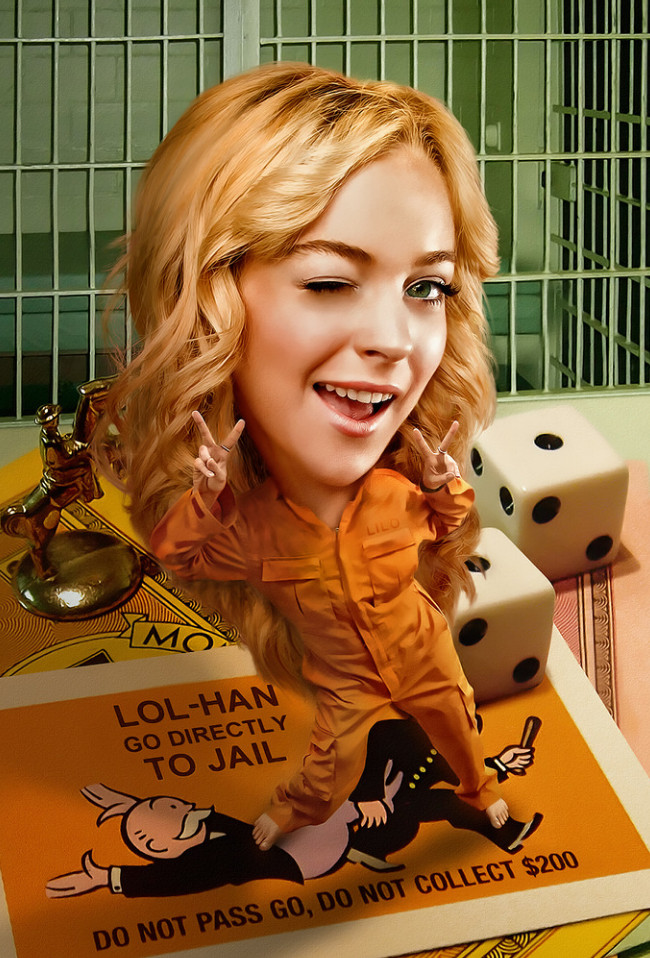I have this inexplicable empathetic connection with Lindsay Lohan—I always have.
When I was partying it up, at 22, living for the next VIP entrance and dancing until the wee hours on the weekend nights (and weekday nights, if truth be told) across London, she was across the pond, stumbling out of bars in Los Angeles, make-up smudged and hair a-mess.
She was an exaggerated archetype of the quarter-life crisis we were all going through at that time—never able to get anything right in the eyes of others, not quite sure what direction she was headed in or who she wanted to be, but always grappling to get back on a meaningful path for herself.
In our heart of hearts, we empathised with her plight, but we probably kept quiet about it, because the rest of us were struggling with a similar crisis of meaning—just out of teenagerdom, moving toward adulthood with the whole world at our feet, but struggling to create an authentic identity for ourselves.
And so in this, perhaps her deepest struggle, her words rang true.
Here are my favourite words of wisdom from Lindsay Lohan, and how they can help infuse more meaning into life:
1. “I know that in my past I was young and irresponsible—but that’s what growing up is. You learn from your mistakes.”
Lindsay has struck the balance of neither living in the past in guilty judgement of herself, nor anticipating more of the same in the future. Instead, she has moved to the point of reflection and reconciliation of her experiences and has taken away a meaningful lesson, that her mistakes have helped her grow.
A Course in Miracles teaches us that we need to let go of the past—it is by definition gone, and peace can only be attained by the complete forgiveness of the old.
It took many years, but in observing the fact that the past is over and it does not define me, I was able to move beyond much of the personal guilt I harbour, and take each moment as an opportunity for new choices, with minimal reference to those experiences and anticipated future events.
2. “I’m at my happiest when I’m on a movie set. It’s like therapy for me.”
In spite of all the scandal and constant slandering, Lindsay was clear on what lights her up from the inside—acting. She would always find a way to overcome the odds and return home to it.
Doing what lights us up can be like therapy because we are in our most natural state of existence. When we dedicate time to that which feels authentic to us, we have found an outlet for all that has been pushed down, dismissed and denied.
It is only in my later years that I have learned to observe, and remember, what I was doing when I was in my happiest, most creative expression—walking, painting, writing, mountain biking—and I make sure I do more of that.
3. “When someone tells me not to do something, I’ll do it more.”
This is very personal to me, because this is exactly what I do.
My fiancé knows that almost every day I will playfully say to him, “Don’t tell me what to do!,” and defiantly cross my arms. It’s become a bit of an in-joke for us.
Lindsay’s quote here is more about accepting our own characteristics, or what in psychoanalysis might be defined as meeting the shadow, that is, acknowledging the parts of ourselves that we don’t accept: our aggression, shame, guilt and pain.
They are real, and though we always try to live on the light and virtuous side, these hidden parts of our humanity have substance, and so will cast a shadow in our everyday life.
When we become familiar with our shadow, and aware of those circumstances that provoke taboo emotional reactions, we begin to integrate all sides of ourselves and reduce the destructive potential of the dark side of our consciousness—which exists, whether we like it or not.
Although this obstinate characteristic still exists in me, I am more light-hearted about its expression. Rather than allowing it to overrun my mind and cause discord and arguments, the simple observation of the associated emotions coming toward me has lessened its hold over me.
4. “No one is perfect. It’s not interesting to be perfect.”
Ah, the endless strive for perfection—oh how long you have evaded me, my sweet sweet, temptress.
Four years ago I had a recurring nightmare in which I would find myself standing on stage trying to perform to an expectant but faceless crowd, but I didn’t have the first clue what I was supposed to be performing for them. All I knew was they were disappointed with me. I woke up each time in a cold sweat.
Marion Woodman, author of Addiction to Perfection, suggests that many of us strive to turn ourselves into a work of art because our culture emphasises specialization, purpose and goals. In the relentless demand to do our best at school, on the job, in our relationships, to create our own image of perfection, we forget that we are human beings.
Perfection is for the realm of the gods and yet we have this innate, almost irrational desire for it. In striving for that which is impossible we are inherently defeated. As human beings we must learn to be fulfilled in so far as is possible for us—by reaching a sense of completeness or wholeness.
Now I strive to understand every side of myself so that my being feels integrated, rather than perfect, and I haven’t been woken up by a nightmare to perform since.
5. “It’s so weird that I went to rehab. I always said that I would die before I went to rehab. But I thought, ‘I’m going to stay here tonight.’ And I stayed there for a month. It was great.”
Lindsay would rather die than go to rehab—the strength of her language reveals just how much she feared this experience, yet what she has done is approach her fears in bite-sized pieces in order to cope with them.
How often do we feel overwhelmed by our fears seeping into our everyday life? We fear situations because we are scared of the state of mind that will result from it—that is, the prospect of irreparable damage to our psyche. Quite simply, we are afraid that we won’t be able handle it.
It’s a deeply primal and evolutionary urge to avoid our fears, but Lindsay’s got it right—“Can I handle one night at rehab?” Yes, she could—that much she knew. It’s the baby steps of expanding our comfort zone that reveal we can be comfortable, and in fact thrive, as we slowly edge beyond our boundaries, one small and manageable risk at a time.
How can one Hollywood millennial starlet gone wild help us learn how to lead a more meaningful life? By showing us that the gap between her experiences and ours is smaller than we think.
Lindsay’s vulnerability during her coming-of-age struggle may have been exaggerated, even to the point of caricature as Lindsay noted herself:
“I just feel like it’s become a situation where people have manifested this caricature of who I am, and they act as if there is no real person inside.”
However, it is in the extremes that we learn the best lessons. Her plight was similar to our own—we also wish to understand who we are and what we truly want from life. In the process we want to find a way to manage cultural and personal expectations, the desire for perfection, and our deep-seated fears.
It is not so much the resolution of these problems that gives us courage, but the knowledge that we are not alone in experiencing them.
So thank you Lindsay Lohan for making us feel like, in spite of it all, that we belong.
Sources:
1. A Course In Miracles Combined Volume (2007), Foundation for Inner Peace
2. Woodman, Marion (1982), Addiction to Perfection
~
~
~
Author: Jennifer Francis
Photo: Flickr
Editor: Lieselle Davidson







Read 0 comments and reply